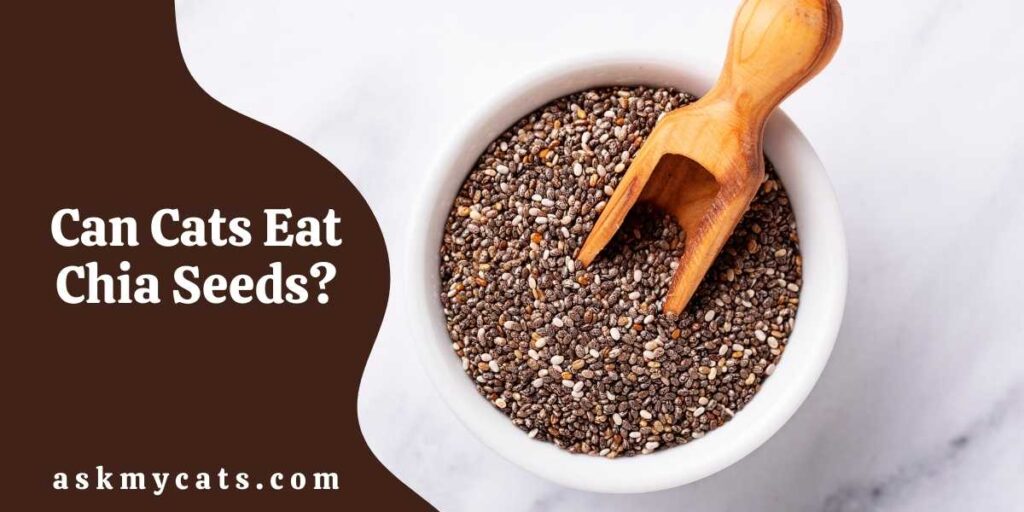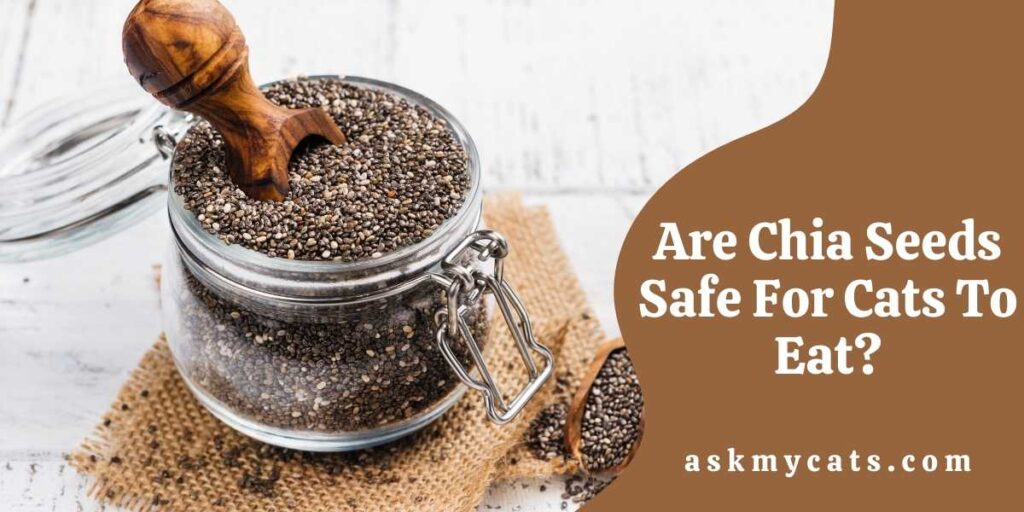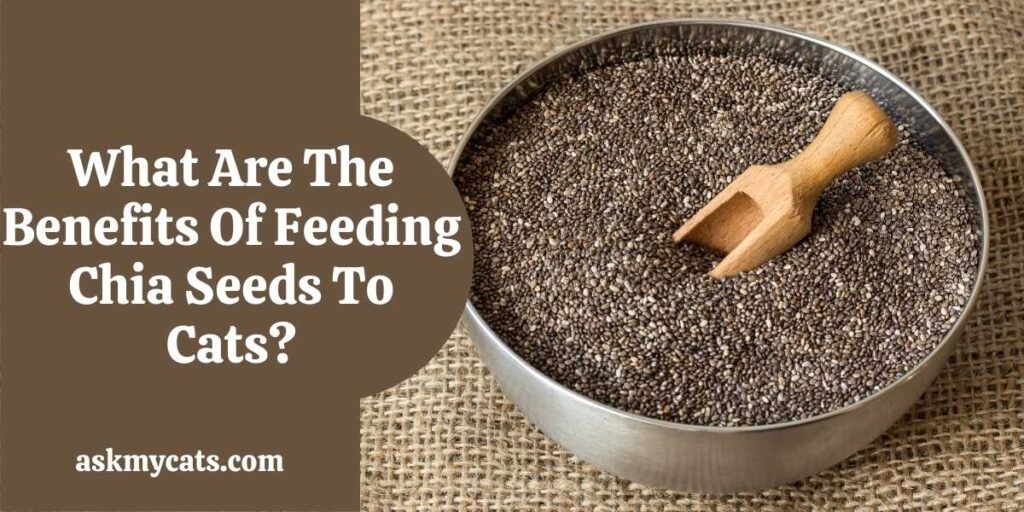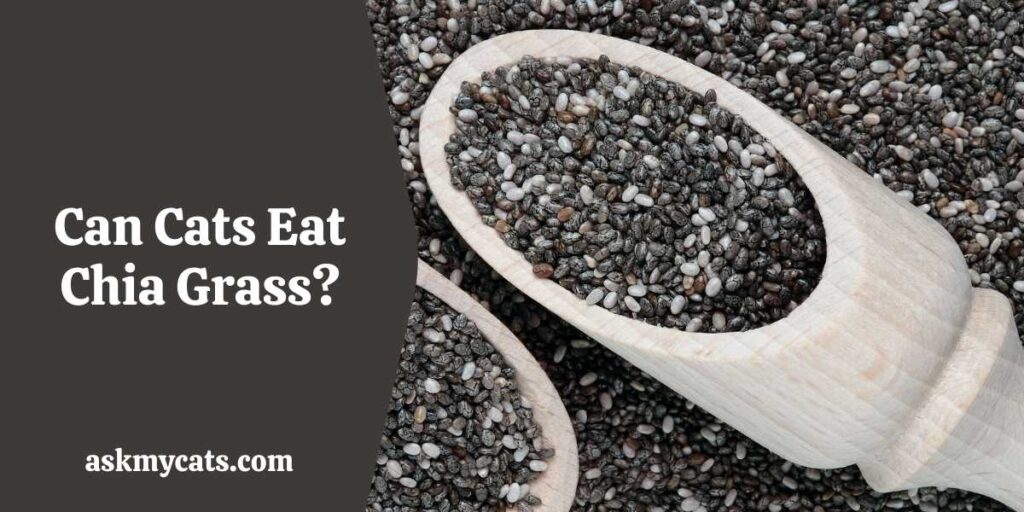Chia seeds were a staple meal in certain ancient cultures. These seeds have recently regained popularity due to their numerous health advantages.
Because they are high in vitamins, fiber, antioxidants, omega-3 fatty acids, and protein, the seeds have a variety of health benefits.
Chia seeds may be turned into tasty grass when hydrated and germinated. Humans can benefit from chia seeds as a nutritional supplement.
However, can cats eat chia seeds?
Yes, cats can eat chia seeds. When it comes to cat supplements, chia seeds can be a wonderful choice because of the numerous health benefits they can bring, as well as how simply you can incorporate them into your cat’s current diet.
This article will help you understand the benefits that chia seeds have and how can you incorporate them into your cat’s diet.


Give Your Cat the Perfect Day
Get the Free Ebook!
What Are Chia Seeds?
Chia seeds are the edible seeds of Salvia hispanica, a flowering plant in the mint family (Lamiaceae) native to central and southern Mexico, or of the related Salvia columbariae of the southwestern United States and Mexico.
Chia seeds are harvested from two types of plants. Salvia hispanica is a plant endemic to Mexico’s central and southern regions, as well as Guatemala.
The Salvia columbariae is endemic to Arizona, Nevada, California, Utah, and New Mexico, among other places.
Since the Mayans and Aztecs, these tiny seeds have been used as a food source. The word “chia,” which means “strength” in Mayan, is derived from the Mayan language.
The chia plant is a member of the mint plant family. Depending on the plant kind, the seeds are either black or white.
The seeds are hydrophilic, which means they want to be near water. They may absorb up to 12 times their own weight when saturated. They also form a distinct jelly-like covering.
Chia seeds can be consumed unsoaked and can be found in a variety of human foods, including tortillas and pizza dough, as well as granola bars and salads.
They can also be soaked and added to smoothies, made into chia pudding, or eaten as chia Fresca on their own.
Chia seeds are high in a variety of nutrients, comprising 486 calories, 12 grams of carbs, 4 grams of fiber, 74 grams of lipids (including omega-3 fatty acids), and 5 grams of protein in 100 grams of unsoaked seeds.
Vitamin A, Folate, Potassium, Iron, Magnesium, Manganese, Selenium, Zinc, Niacin, Phosphorous, Calcium, and Copper are just a few of the vitamins and minerals found in them.
Chia seeds are high in antioxidants, which can help protect your cat from ailments such as cancer and heart disease.
They also have a mixture of 18 distinct amino acids, all of which are necessary for proper development and growth.
Check out more details about can cats eat sesame seeds
Are Chia Seeds Safe For Cats To Eat?
Yes, chia seeds are safe for cats to eat.

Chia seeds have a lot of health benefits, so if you’re looking for a supplement for your cat, you might think about including these multipurpose seeds in his or her diet.
Is this a good idea, or should you stay away from chia seeds if you have a cat?
In a nutshell, chia seeds are perfectly safe for your cat to consume. These small seeds, in fact, have a slew of health benefits that could help your cat look and feel better.
“Can cats eat chia seeds?” is a question that has a simple answer: “Yes” The rich nutrient content of Salvia Hispanica (Chia) seeds would provide significant benefits to your cat’s immune system, eyes, joints, and fur.
Chia seeds will also be cost-effective snacks for both humans and cats due to their relatively long shelf life.
Even the pickiest eaters would certainly accept the seeds because of their delicate flavors and aromas.
Flexible preparation methods provide you with even more options when it comes to giving chia seeds to your cat.
Because chia seeds expand rapidly when they come into touch with water or other liquids, they can cause a variety of problems when they slow down.
The seeds, for example, enlarge as they pass through the esophagus, creating a formidable barrier.
Keep in mind that resolving seed-related esophageal obstructions takes a long time and effort for veterinarians.
Is your cat already suffering from a swallowing problem? Then you must be cautious and stay away from chia seeds. When your cat’s health is at stake, there’s no reason to take chances.
Check out more details about can cats eat poppy seeds
What Are The Benefits Of Feeding Chia Seeds To Cats?
The main benefit of feeding chia seeds to cats is that it contains omega-3 fatty acid and is high in fiber which prevents diarrhea and constipation in cats.

Chia seeds are typically touted as a powerful dietary supplement for people, but it turns out that the tiny seeds have a slew of health benefits for your cat as well.
To begin with, chia seeds are omega-3 fatty acid powerhouses that provide even more omega-3 fatty acids than salmon!
Omega-3 fatty acids can assist your cat’s coat to stay in good condition and can also help with inflammation.
Chia seeds are also high in fiber, which may be beneficial to cats that have digestive issues. Chia seeds can also assist to keep your cat hydrated because of their capacity to retain water.
Vitamin A, B3, and B12, as well as the minerals zinc, potassium, and thiamine, are all abundant in chia seeds.
Because of the high fiber content, chia seeds can help your cat maintain a healthy digestive system. Fiber absorbs toxins, supports gut flora health, and prevents diarrhea and constipation.
Chia seeds include antioxidants that help to minimize the effects of free radicals in the body’s environment. These can lead to cancer and oxidative cell damage.
Chia seeds have a high protein level, which helps your cat feel full and supplements the protein they get from their meat-based diet.
The gel-like chia seeds assist the remainder of your cat’s food travels through their digestive tract at a slower rate when fed soaked. This means that their bodies can absorb the most nutrition possible.
Chia seeds are abundant in nutrients and calories, with 100g of raw seeds containing 486 calories, 42.12 grams of carbs (including 34.4 grams of dietary fiber), 16.54 grams of protein, and 30.74 grams of lipids (including five omega-3 fatty acids), and 5.8 grams of water.
They also contain significant amounts of vitamin A, folate, and potassium, as well as phosphorus, manganese, magnesium, iron, calcium, zinc, thiamine, and niacin.
All of these nutrients, including protein, omega-3 fatty acid-rich fats, and other vitamins and minerals, will help your feline companion because they play several critical roles in their bodies.
Chia seeds have all of the essential amino acids, including valine, tyrosine, phenylalanine, arginine, cysteine, methionine, leucine, threonine, and tyrosine, histidine, and tryptophan, and have a higher amount of high-quality protein than most plants.
They’re high in fiber, which means that fiber makes up the majority of their carbs (34.4g out of 42.12g of total carbohydrates per 100g).
While cats do not have a physiological requirement for fiber, it is essential for preventing diarrhea and constipation, maintaining a healthy gut, promoting the smooth passage of food in their gut, absorbing toxins, and so on.
Chia seeds contain antioxidants that help neutralize free radicals that can cause oxidative cell damage and contribute to chronic illnesses like cancer and premature aging in cats.
Can Cats Eat Chia Grass?
Yes, cats can eat chia grass as long as it does not suffer from diabetes.

Chia grass is safe for cats as long as they don’t have diabetes because chia seeds can help with blood sugar levels.
Furthermore, if ingested in high amounts, chia seed oil may reduce blood pressure and may interact with some drugs.
Always consult a veterinarian before introducing new food to your cat.
Although an allergic reaction is theoretically possible, the grass has not been linked to many severe health issues.
Adult cats and kittens can both consume chia grass.
Chia grass may even aid in the development of stronger bones and healthier skin in kittens.
It is not hazardous to offer them a small amount of the herb because it has no negative effects on their bodies. Kittens, in fact, require more omega-3 fatty acids than adult cats.
As a result, adding the plant to their diets is beneficial.
The grass is proven to help senior cats reduce inflammation, and it can also help kittens. It aids in the maintenance of their joints as they mature into adults.
Chia grass also provides crucial vitamins like folate, which kittens require for proper bone development.
Overall, chia grass is not harmful to kittens and cats.
How To Feed Cats Chia Seeds?
The most effective way to feed chia seeds to your cat is to add them to their wet food meals.
Chia seeds are widely available these days, with most health food stores and supermarkets carrying the tiny seeds.
When you’re ready to feed chia seeds to your cat, the best option is to mix them in with his or her regular wet food. Just make sure to soak the seeds in water for a few minutes before using them. This will make them easier to digest for your cat.
Because chia seeds are relatively tasteless, you shouldn’t have any trouble getting your cat to eat them.
It’s advisable to start small with the number of chia seeds you give your cat. Consult your normal veterinarian for advice on how much chia seeds to add to your cat’s food.
The exact recipe and frequency will most likely be determined by your cat’s size and nutritional requirements.
It’s common to practice slightly grounding the seeds so that more nourishment is taken as they move through your cat’s digestive tract.
You can feed them without grinding them, but a portion of the seeds will pass through your cat’s system undigested, resulting in no nutritional benefit.
How Much Chia Seeds Should You Feed Your Cat?
You should feed ½ teaspoon of chia seeds for every 5 pounds to your cat.
Experts recommend working up to feeding ½ teaspoon of chia seeds for every 5 pounds of your cat’s weight.
Before feeding, remember to measure the seeds dry and then soak them. Follow the instructions for your particular brand of chia seeds, and add as much water as they recommend.
After soaking, you can sprinkle or mix the seeds into your cat’s wet food. Some cats may consume soaked chia seeds on their own or blended with a small amount of beef broth to make them more appealing.
Start with a little number of chia seeds for your cat — around a quarter teaspoon of soaked seeds should suffice.
Over the next 24-48 hours, keep an eye on your cat’s behavior. Keep an eye out for any signs of discomfort, as well as diarrhea or constipation in your cat. It’s always a good idea to consult your veterinarian before introducing any new meals to your cat.
Frequently Asked Questions
Can I feed dry chia seeds to my cat?
It is not recommended by experts. The seeds will soak up any water that comes into contact with them as they transit through your cat’s digestive system. If your cat eats a lot of seeds at once, they will enlarge and obstruct your cat’s digestive tract as they absorb water. If your cat’s digestive system becomes completely obstructed, this can cause anything from slight discomfort to an emergency crisis, depending on the region.
What happens if my cats consume too many chia seeds?
Expect minor diarrhea if a cat accidentally takes more chia seeds than its body can tolerate. Aside from that, there are no major difficulties to be concerned about when it comes to overfeeding chia seeds.
Is it possible for cats to have a chia seed allergy?
During the spring and summer months, some cats are allergic to chia seed grass, flowers, and pollination. In cats, this is known as grass allergies or hay fever. Homegrown chia grass is unlikely to produce allergic reactions. However, if your cat is sensitive to grass, especially during the summer and spring, don’t take any chances. The allergies are caused by grass pollen getting into the cats’ nostrils. The cat’s body perceives it as a foreign thing and reacts inappropriately. There should be no concern because the cat is eating it right after it sprouts.
Final Words
Chia seeds are high in a variety of nutrients that can help increase your cat’s immune system, protect them from free radicals, and improve their digestive system’s performance.
Chia seeds are eaten by some cats when mixed in with their food, while others like them in a broth. Always feed the seeds soaked, as they absorb a lot of water and might cause a blockage in your cat’s digestive system otherwise.
If you have any questions, ask us in the comments section.
